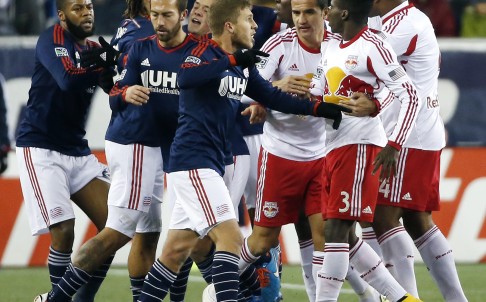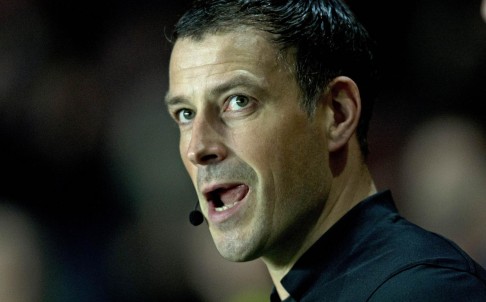Rational Ref: Why football players need to leave their handbags at home
Mass
confrontations and amateur dramatics tarnish the game - and even the
colloquialism used to describe them could be seen as sexist
New England Revolution players scuffle with New York Red Bulls players in a classic case of "handbags". Photo: AP
Soccer
is far more successful in promoting the idea of handbags to the world
than either Louis Vuitton or Prada. This fashionable colloquialism
describes spiky confrontations where the rowdy participants are not
really serious about inflicting actual bodily harm on each other.We see handbags all the time, where players scuffle with one
another, call each other names, put their hands on necks and faces, and
flick rude gestures.
Essentially, these asinine actions are non-threatening but each individual will have their own personal interpretation of what they deem to be aggressive, intimidating or provocative. When these personal interpretations differ wildly, things start to kick off and we have handbags or what referees officially call "mass confrontations".
Some players have thick skins and never rise to the bait,
others will give as good as they get, a few will try to tell the referee
what's going on, while others will overreact, which usually leads to a
handbag melee.
Everyone wants to pressure referees to "lay down the rule of law" hard on their opponents, while simultaneously badgering the referee to be lenient with them.
Does this sound familiarly hypocritical in light of the Occupy Central movement where there have been plenty of handbags on the streets?
 Nicolas Otamnedi reacts after an altercation with Barcelona's Brazilian forward Neymar at the weekend. Photo: AFPThere
were also plenty of handbags during Valencia's 1-0 loss to Barcelona
last weekend. When Neymar went down theatrically following a challenge
from Nicolas Otamendi, the Valencia defender felt the Barcelona forward
was trying to cheat and bent down to remonstrate with him.
Nicolas Otamnedi reacts after an altercation with Barcelona's Brazilian forward Neymar at the weekend. Photo: AFPThere
were also plenty of handbags during Valencia's 1-0 loss to Barcelona
last weekend. When Neymar went down theatrically following a challenge
from Nicolas Otamendi, the Valencia defender felt the Barcelona forward
was trying to cheat and bent down to remonstrate with him.
As Otamendi put his hand on Neymar's neck and stuck his head in his face for good measure, Neymar pushed his forehead forward, which subsequently led to Otamendi outdoing Neymar's theatrics by grabbing his own face as if he had been heavily struck. Other players joined in the handbags dance, as everyone shoved and shouted to get opponents sent off.
In the aftermath, neither Neymar nor Otamendi's amateur
dramatics were punished whereas yellow cards were shown to Gerard Pique
and Antonio Barragan for escalating the chaos.
Such moments tarnish the game because at the end of the day it is still cheating, instead of focusing on playing ball.
This is why Sunderland's John O'Shea should be commended for his professionalism against Chelsea last week. When Chelsea forward Diego Costa over-reacted to a strong challenge, pushing his legs and boots out towards the Sunderland centre-half, O'Shea refused to make a meal of it and simply brushed off the potentially explosive incident. Other players would have used the opportunity to play handbags in the hope of influencing the referee to send off Costa.
 Sunderland's John O'Shea tangles with Chelsea forward Diego Costa during their clash last weekend. Photo: Reuters
Sunderland's John O'Shea tangles with Chelsea forward Diego Costa during their clash last weekend. Photo: Reuters
There is also a serious side to these slang terms. Commentator and former player Stan Collymore is now in the dock for using the term "fairies" to describe Sergio Aguero's reaction of going to ground too easily. Traditionally, "fairies" is used to denote femininity in men, but it also has homophobic connotations.
Collymore's remark was immediately criticised by Football v Homophobia, the worldwide initiative opposing homophobia in the game. They said: "Whatever you think about diving, homophobic abuse is unacceptable."
While anti-homophobia groups have condemned Collymore, a spokesperson for the anti-discrimination group Kick It Out said: "Only Stan Collymore himself would be able to clarify what he meant when using the word. There does need to be greater education around the use of such terminology, as 'fairy' has historically been used as a slur towards members of the LGBT community. It is important these sensitivities are recognised."
Surely feminist groups could take offence to the apparently
sexist use of the term "handbags". Therefore, should the soccer
community stop using the term and find another more politically correct
label for the unsavoury antics? If handbags become a fashion faux pas,
how about the term "manbags" or "murses"?
These days, players have no sensitivity or hesitation in using the "F" and "C" words, but as soon as an apparently discriminatory slur is uttered then that's when the lobbyists complain and take it to be abusive and serious.
It is no longer handbags when some words hurt more than others.
Agree of disagree? Contact Rational Ref at rationalref@gmail.com
Essentially, these asinine actions are non-threatening but each individual will have their own personal interpretation of what they deem to be aggressive, intimidating or provocative. When these personal interpretations differ wildly, things start to kick off and we have handbags or what referees officially call "mass confrontations".
Everyone wants to pressure referees to "lay down the rule of law" hard on their opponents, while simultaneously badgering the referee to be lenient with them.
Does this sound familiarly hypocritical in light of the Occupy Central movement where there have been plenty of handbags on the streets?
 Nicolas Otamnedi reacts after an altercation with Barcelona's Brazilian forward Neymar at the weekend. Photo: AFPThere
were also plenty of handbags during Valencia's 1-0 loss to Barcelona
last weekend. When Neymar went down theatrically following a challenge
from Nicolas Otamendi, the Valencia defender felt the Barcelona forward
was trying to cheat and bent down to remonstrate with him.
Nicolas Otamnedi reacts after an altercation with Barcelona's Brazilian forward Neymar at the weekend. Photo: AFPThere
were also plenty of handbags during Valencia's 1-0 loss to Barcelona
last weekend. When Neymar went down theatrically following a challenge
from Nicolas Otamendi, the Valencia defender felt the Barcelona forward
was trying to cheat and bent down to remonstrate with him.As Otamendi put his hand on Neymar's neck and stuck his head in his face for good measure, Neymar pushed his forehead forward, which subsequently led to Otamendi outdoing Neymar's theatrics by grabbing his own face as if he had been heavily struck. Other players joined in the handbags dance, as everyone shoved and shouted to get opponents sent off.
Such moments tarnish the game because at the end of the day it is still cheating, instead of focusing on playing ball.
This is why Sunderland's John O'Shea should be commended for his professionalism against Chelsea last week. When Chelsea forward Diego Costa over-reacted to a strong challenge, pushing his legs and boots out towards the Sunderland centre-half, O'Shea refused to make a meal of it and simply brushed off the potentially explosive incident. Other players would have used the opportunity to play handbags in the hope of influencing the referee to send off Costa.
 Sunderland's John O'Shea tangles with Chelsea forward Diego Costa during their clash last weekend. Photo: Reuters
Sunderland's John O'Shea tangles with Chelsea forward Diego Costa during their clash last weekend. Photo: Reuters There is also a serious side to these slang terms. Commentator and former player Stan Collymore is now in the dock for using the term "fairies" to describe Sergio Aguero's reaction of going to ground too easily. Traditionally, "fairies" is used to denote femininity in men, but it also has homophobic connotations.
Collymore's remark was immediately criticised by Football v Homophobia, the worldwide initiative opposing homophobia in the game. They said: "Whatever you think about diving, homophobic abuse is unacceptable."
While anti-homophobia groups have condemned Collymore, a spokesperson for the anti-discrimination group Kick It Out said: "Only Stan Collymore himself would be able to clarify what he meant when using the word. There does need to be greater education around the use of such terminology, as 'fairy' has historically been used as a slur towards members of the LGBT community. It is important these sensitivities are recognised."
These days, players have no sensitivity or hesitation in using the "F" and "C" words, but as soon as an apparently discriminatory slur is uttered then that's when the lobbyists complain and take it to be abusive and serious.
It is no longer handbags when some words hurt more than others.
Agree of disagree? Contact Rational Ref at rationalref@gmail.com
This article appeared in the South China Morning Post print edition as Let's leave nasty handbags at home
PUBLISHED : Thursday, 04 December, 2014
P.S. All the very best to all referees for the New Year!!












